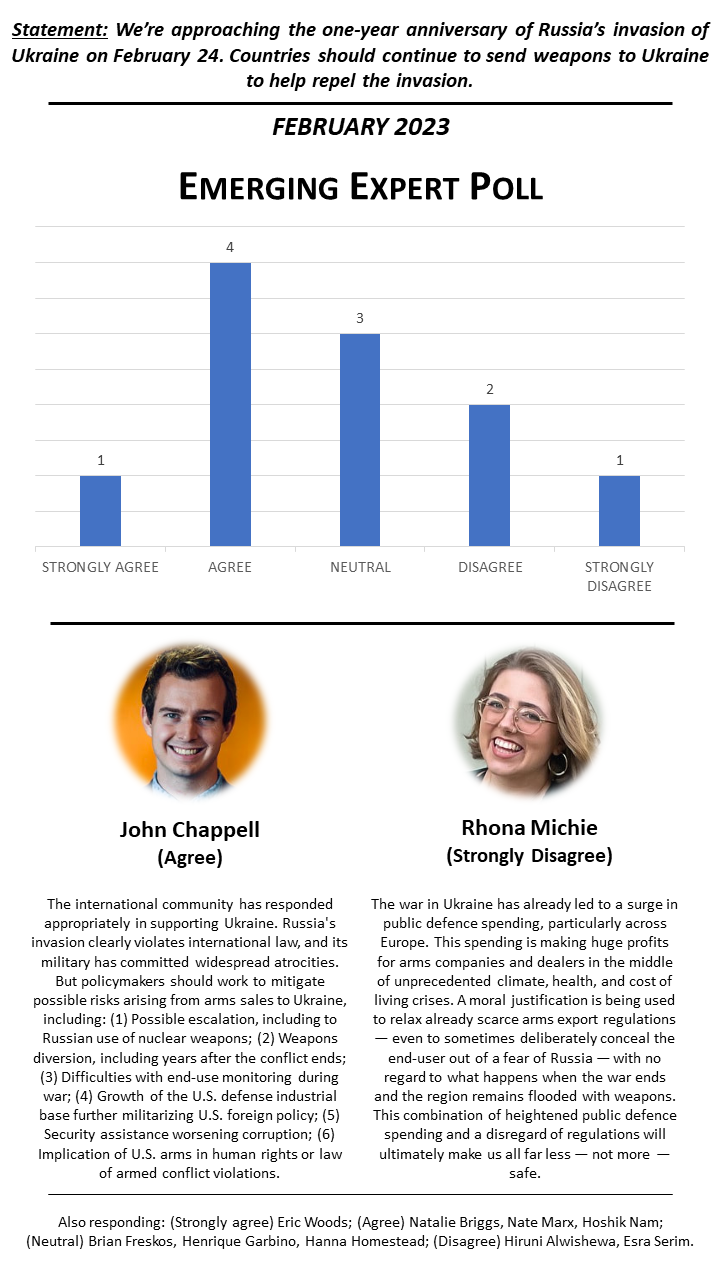Continue weapons to Ukraine?
The Forum asks Emerging Experts*
February 20, 2023
February 20, 2023
STATEMENT: We’re approaching the one-year anniversary of Russia’s invasion of Ukraine on February 24. Countries should continue to send weapons to Ukraine to help repel the invasion.
See all responses below, and click on photos for more information about each expert:
Strongly Agree
|
Eric Woods
Ukraine has suffered an illegal war of aggression. So far, it has more or less fought at the standard of a Western nation and followed the laws of armed combat. The Russian government is re-enacting the darkest chapters of that country's history. In terms of global stability and security, it is vital that Putin is defeated and is unable to re-arm for another attempt through the circumvention of trade and export controls on dual-use goods. We are already seeing massive levels of dual-use goods reaching Russia through third countries. |
Agree
|
Natalie Briggs
Countries should continue to support Ukraine, a sovereign nation who was invaded in a violation of the foundational principles of the UN system. However, there must be sufficient safeguards and end-use monitoring to prevent diversion to the illicit market. Countries providing weapons must not only consider appropriate controls to prevent diversion during the ongoing crisis but also think ahead to the post-conflict period. Extra attention should be paid to small arms and light weapons, which have historically presented high risks for diversion in conflicts. |
|
John Chappell
The international community has responded appropriately in supporting Ukraine. Russia's invasion clearly violates international law, and its military has committed widespread atrocities. But policymakers should work to mitigate possible risks arising from arms sales to Ukraine, including: (1) Possible escalation, including to Russian use of nuclear weapons; (2) Weapons diversion, including years after the conflict ends; (3) Difficulties with end-use monitoring during war; (4) Growth of the U.S. defense industrial base further militarizing U.S. foreign policy; (5) Security assistance worsening corruption; (6) Implication of U.S. arms in human rights or law of armed conflict violations. |
|
Nate Marx
Though the West should continue to help Ukraine defend itself against the unnecessary and cruel Russian invasion, it must take the possibility of nuclear escalation seriously and avoid providing support that Russia considers existentially threatening, especially helping Ukraine to retake Crimea. Regardless of the righteousness of Ukraine’s cause, war in the nuclear age requires guardrails; and despite the wishes of Western policymakers, Russia is a nuclear power. If the nuclear taboo of the past 75-plus years were to be broken, the global consequences would be catastrophic. The West must do everything in its power to ensure this does not happen. |
|
Hoshik Nam
When providing arms to Ukraine, the global community should carefully consider the extent to which Russia would accept the empowerment of Ukraine. Leaving nuclear weapons as the only option to Russia is the least desirable outcome. At the same time, however, the arms-providing countries should make sure that Russia cannot simply overcome Ukraine militarily. If that happens, it will set the precedent that war is a viable option for non-democratic countries to achieve their political goals. In this sense, the arms providers should pursue diplomatic solutions to finish the war while maintaining the minimum provision of arms to Ukraine to help it defend itself. |
Neutral
|
Brian Freskos
There are several legitimate reasons to continue providing military assistance to Ukraine, not least of which is to help stop Russian atrocities against Ukrainian civilians. One cannot look at images of Russian war crimes in towns such as Bucha and not feel morally compelled to aid Ukraine in repelling this unjustified invasion. Simultaneously, however, history has shown that military assistance carries many risks, including conflict spillover and diversion. Reports have already emerged about weapons from Ukraine being trafficked into Africa and the EU. If the international community continues providing assistance to Ukraine, it needs to do everything possible to minimize these risks. |
|
Henrique Garbino
If states continue sending weapons to Ukraine, they should prioritise precision-guided munitions (and adequate weapon systems) that can minimise collateral damage owed to a lack of precision and accuracy. They should also provide adequate training on these weapons systems to ensure that targeting, aiming, and firing drills are appropriately conducted, and to ensure proper maintenance and storage of the weapons systems and their ammunition. Especially for long-range and high-yield weapons, such as artillery systems, small mistakes and errors due to poor training or maintenance can lead to significant deviations from the intended target and cause severe harm to civilians. |
|
Hanna Homestead
Depends. The West should have transitioned to renewable energy decades ago for environmental reasons and to handicap Russia's fossil fuel economy and imperialist aggression. That didn't happen due to corporate corruption and U.S. imperialism. So Russia is a global power who can invade, saber-rattle nukes, and prop up regimes like Iran. After a year of war and billions spent, we're now in a lose-lose scenario. If Ukrainian victory is realistically possible soon, it may be worth the harms of the arms trade. But supplying weapons to a protracted conflict while pushing China away will only weaken the U.S. at home and abroad, prolong the suffering globally, and exacerbate the climate crisis. |
Disagree
|
Hiruni Alwishewa
Sending further weapons will only prolong the war, and potentially have significant regional and global impacts and further negative consequences for human rights. The current conflict between Ukraine and Russia should be viewed as part of an ongoing escalation of Russian actions since its annexation of Crimea nine years ago in 2014. Military solutions, including providing further arms to Ukraine and potentially also sending foreign troops, are insufficient measures by themselves. There needs to be a greater focus on political solutions to resolve this crisis before it spills over into the region and extends beyond a decade. |
|
Esra Serim
Neither Russia nor Western countries should send weapons, equipment, or soldiers to Ukraine. Peace negotiations should be put on the agenda of Europe/U.S. and Russia as soon as possible. Any talk between Russia and Ukraine would save lives. If this doesn’t happen, the costs for both sides will mount. Europe will face more refugee and economic crises. A prolonged conflict will also bring more casualties both in Ukraine and in Russia. |
Strongly Disagree
|
Rhona Michie
The war in Ukraine has already led to a surge in public defence spending, particularly across Europe. This spending is making huge profits for arms companies and dealers in the middle of unprecedented climate, health, and cost of living crises. A moral justification is being used to relax already scarce arms export regulations — even to sometimes deliberately conceal the end-user out of a fear of Russia — with no regard to what happens when the war ends and the region remains flooded with weapons. This combination of heightened public defence spending and a disregard of regulations will ultimately make us all far less — not more — safe. |
* Inclusion in this list does not indicate agreement with or endorsement of the opinions of others, nor do the opinions necessarily reflect those of the institutions with which emerging experts are affiliated. To learn more about the Emerging Experts list and program, click here. The Forum itself does not take positions.
This program is supported by the Rosa-Luxemburg-Stiftung New York Office with support from the German Ministry for Economic Cooperation and Development (BMZ). The Forum's work is further supported by the Carnegie Corporation of New York and the Rockefeller Brothers Fund.
This program is supported by the Rosa-Luxemburg-Stiftung New York Office with support from the German Ministry for Economic Cooperation and Development (BMZ). The Forum's work is further supported by the Carnegie Corporation of New York and the Rockefeller Brothers Fund.












